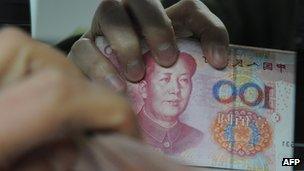China loosens currency controls on the yuan
- Published

Beijing has given indications that it is willing to loosen its grip slightly on the yuan
China has loosened its currency controls in a move that may spur gains in the value of the yuan.
From Monday, the yuan can fluctuate up to 1% in trading against the US dollar from a fixed price set by the central bank, the People's Bank of China said.
That is up from the previous limit of 0.5%.
<link> <caption>The increase of the trading band was announced in English</caption> <url href="http://www.pbc.gov.cn/publish/english/955/2012/20120414090756030448561/20120414090756030448561_.html" platform="highweb"/> </link> , a rare statement that suggests it was targeted at foreign audiences.
China has been under pressure to let the yuan appreciate.
Nations like the US believe that China keeps the yuan artificially low to boost its exports, giving it an unfair trading edge.
The US Treasury Department on Sunday welcomed the move.
"China's decision to widen the daily trading band for its exchange rate, if implemented in a way that allows the value of the exchange rate to reflect market forces, could contribute rebalancing, which would be positive for China, the United States, and the global economy," an official told Reuters.
He added there was still a "misalignment" with regards to China's exchange rate and more progress is needed.
Evolving situation
The PBOC said on Saturday that the band was increased to "meet market demands, promote price discovery, enhance the flexibility of RMB (yuan) exchange rate in both directions".
China's yuan was fixed against the dollar until 2005, when it was lifted and allowed to float against a basket of currencies each day.
Since then, the yuan has risen 31% against the dollar - to about 6.30 yuan at the moment.
Last month, China and Australia signed a currency swap agreement in a bid to promote bilateral trade and investment.
It will allow for the exchange of local currencies between their central banks, worth up to 30bn Australian dollars ($31bn; £20bn) over three years.
The deal is expected to reduce cost for businesses, as they will be able to settle trade terms in local currency.
It is the latest in a series of similar deals signed by Beijing as it seeks a more global role for the yuan.
- Published16 April 2012
- Published22 March 2012
- Published11 January 2012
- Published13 March 2012